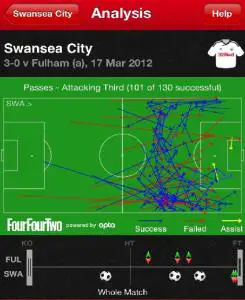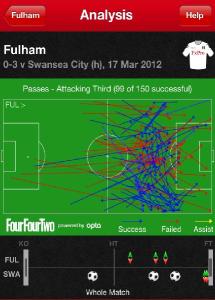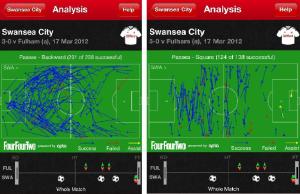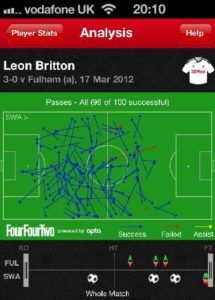There is no secret to Swansea
But this should not be such a surprise. Promoted teams have, by definition, had very successful league campaigns the year before. The same question is always posed to these clubs. Stick or twist? It applies not only to style of play, but also to investment. A Chairman can choose to rubber stamp ambitious moves for players with good experience or great promise, paying out on transfer fees and extravagant wages, or they can cautiously withhold funds (If indeed funds are available) and hope that the existing playing and non-playing staff can withstand the onslaught. The manager too is asked the same question, and of course in discussion with the money men at the club will choose to either stay true to their attacking ideals or try to adopt a defensive approach. The two questions are inextricably interlinked. Strangely though, although one decision informs the other, it’s often the case that if the decision is made to stick with the system, investment is made, and conversely if a club decides to change tack from attacking expansive football to gritty survival football, then the money isn’t spent. So a club would end up trying to implement a defensive strategy with their existing attacking squad. This is of course a simplification, but a promoted team will have to position themselves somewhere on a sliding scale of financial and football gambling.
QPR, for example, exclusively set out in an exciting 4-2-3-1 formation during their promotion year, but under Warnock and now Hughes they have chosen to try and weather the storm by playing defensively and picking up points where they can, rather than going for broke in each game and indeed the campaign. Not a huge amount was invested in the playing squad in the summer break. DJ Campbell (£1.2m) and Anton Ferdinand (£3m) were brought in, supplemented by numerous free signings and loan deals. Not an enormous outlay – and yet the football that the players have been asked to play is vastly different from what they were originally were assembled for. Football players, and even more so a group of players, aren’t the best at adapting to change – just ask Andres Villas-Boas.
What makes Swansea Manchester City
Almost all of Swansea’s passes in the final third of the pitch originated in that zone. There are very few long hoofed balls up to a target man. And, as can be seen by the red arrow which eminate from Swansea’s half, the long balls that were played were not very successful in keeping possession, which is Swansea’s modus operandi. Compared to Fulham’s passing – and remember fulham are the established Premier League side, and were playing at home. Far more long balls played up to the attackers, so consequently far fewer of those passes hit the mark. Territory, but not possession.
Against Arsenal, 54% of passes were either played backwards or square, and Swansea Manchester City Swansea Manchester City
Possession is precious to Swansea Swansea Swansea
There are of course other issues that come with playing very well. A club such as Swansea, even with all the respect they’ve earned on the pitch this year, will struggle to keep hold of star players. Perhaps they were lucky in that way not to really hit the heights before the January transfer window closed. Blackpool where less fortunate – star midfielder Charlie Adam was linked with a move to Liverpool in January 2011, and Ian Holloway stood firm and rejected bids for his player in the belief that he needed him to stay up. Charlie then suffered a loss of form, Blackpool were relegated, and Adam now warms the bench and occasionally misses penalties for the Reds. What is very important for Swansea is the system. The system of simple short passes, possession at all costs, and pressing the opposition needs to be believed in. Team spirit is key to Swansea. The player most are talking about at Swansea is Leon Britton. A remarkable story even in a sport full of remarkable stories. Leon Britton has played in all four divisions with Swansea city, and now finds himselfi n the Premier League and with better passing statistics than anyone sharing a pitch with him. The Wandsworth born wizard has even achieved a better pass completion rate than Xavi at FC Barcelona.
His passing against Fulham rather beautifully describes Swansea’s general style of play. Most of the passing takes place in his own half, the passes are short, often square of backwards, and 96% of them found the intended target. Simple really!
Images are taken from FourFourTwo Stats Zone App















Recent Comments